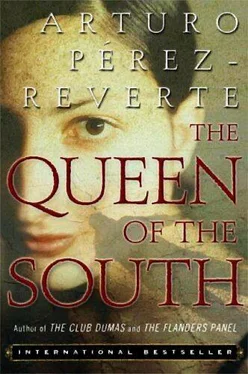Arturo Perez-Reverte - Queen of the South
Здесь есть возможность читать онлайн «Arturo Perez-Reverte - Queen of the South» весь текст электронной книги совершенно бесплатно (целиком полную версию без сокращений). В некоторых случаях можно слушать аудио, скачать через торрент в формате fb2 и присутствует краткое содержание. Жанр: Триллер, на английском языке. Описание произведения, (предисловие) а так же отзывы посетителей доступны на портале библиотеки ЛибКат.
- Название:Queen of the South
- Автор:
- Жанр:
- Год:неизвестен
- ISBN:нет данных
- Рейтинг книги:5 / 5. Голосов: 1
-
Избранное:Добавить в избранное
- Отзывы:
-
Ваша оценка:
- 100
- 1
- 2
- 3
- 4
- 5
Queen of the South: краткое содержание, описание и аннотация
Предлагаем к чтению аннотацию, описание, краткое содержание или предисловие (зависит от того, что написал сам автор книги «Queen of the South»). Если вы не нашли необходимую информацию о книге — напишите в комментариях, мы постараемся отыскать её.
Queen of the South — читать онлайн бесплатно полную книгу (весь текст) целиком
Ниже представлен текст книги, разбитый по страницам. Система сохранения места последней прочитанной страницы, позволяет с удобством читать онлайн бесплатно книгу «Queen of the South», без необходимости каждый раз заново искать на чём Вы остановились. Поставьте закладку, и сможете в любой момент перейти на страницу, на которой закончили чтение.
Интервал:
Закладка:
Which means you're pocketing a little extra commission for yourself this time, too, Teresa said to herself. Fishing boat plus cargo ship plus Chakor's people equals a shitload of cash. She saw that Lataquia was smiling even more broadly, guessing what she was thinking. At least this hijo de la chin-gada doesn't hide it, she thought. It's all out in the open with him. And he always knows where the line is.
She turned to Dr. Ramos. "What about the rubbers? How many units for the transfer?"
The doctor had spread British Admiralty Chart 773 out on the table, the Moroccan coast from Ceuta to Melilla in precise detail. With the mouthpiece of his pipe he indicated a point three miles to the north, between the Velez de la Goma rock and the Xauen bank.
"There are six available," he said. "For two runs of seventeen hundred
kilos each, more or less. With the fishing boat moving along this line,
here, everything can be done in less than three hours. Five, if the seas are high. The cargo is ready in Bab Berret and Ketama. The loading points will be Rocas Negras, Cala Traidores, and the mouth of the Mestaxa."
"Why spread it out so much?… Isn't it better to do it all at once?"
Dr. Ramos looked at her, his expression grave. From another person the question would have offended him, but from Teresa it was normal. She was a micromanager, no doubt about that. Down to the last detail. It was good for her and good for everybody else, because the responsibility for the successes and failures was always shared, and no one had to give too many explanations later if something went wrong.
"Ball-bustingly meticulous," was how Lataquia put it, in his graphic
Mediterranean style. Never to her face, of course. But Teresa knew. She knew everything about everybody on her team. Suddenly she found herself thinking about Teo Aljarafe. Pending, but to be solved in the next few days, too. She corrected herself: She knew almost everything about almost all of them.
"Twenty thousand kilos on one beach is a lot of kilos," the doctor explained, "even with the Moroccan cops in our pocket… I prefer not to have that high a profile. So we've presented it to the Moroccans as three different operations. The idea is to load half the cargo at point one with the six rubbers at the same time, a quarter of it at point two with just three rubbers, and the other quarter at point three with the other three… That way we cut the exposure, cut the risk, and nobody will have to go back to the same place for a refill."
"And what's the weather looking like?"
"At this time of year it can't be very bad. We have a three-day window, and the last night there's almost no moon. We might have some fog, and that could complicate the link-ups. But each rubber will carry a GPS, and the fishing boat will have one, too."
"Communications?"
"The usual: cloned cell phones or scramblers for the rubbers and the fishing boat, the Internet on the big boat… STU walkie-talkies for the transfer itself."
"I want Alberto out there, with all his equipment."
Rizocarpaso, the communications engineer, nodded. He was blond, with a baby face, almost no beard. Introverted. Very good at what he did. His shirts and pants were always wrinkled from the hours he spent with a radio receiver or at a computer keyboard. Teresa had hired him because he knew how to camouflage contacts and operations through the Internet, routing everything through the cover of countries that European and American police didn't have access to: Cuba, India, Libya, Iraq. In minutes he could open, use, and leave dormant several electronic addresses hidden behind local servers in those and other countries, using credit card numbers stolen or purchased through straw men. He was also an expert in steganography- the technique of hiding messages within apparently innocuous electronic documents-and the PGP encryption system.
"What boat?" the doctor asked.
"Any one-a sport boat. Discreet. The Fairline Squadron we have in Baniis might work." Teresa pointed out a broad region on the nautical chart, east of Alboran, to the engineer. "You'll coordinate communications from here."
He gave a stoic smile. Lataquia and the doctor grinned at him mockingly; everyone knew he got deathly seasick on a boat, but Teresa no doubt had her reasons for ordering him to go.
"Where does the link-up with the Xoloitzcuintle take place?" Rizocarpaso wanted to know. "There are spots where there's almost no signal."
"You'll know in good time. And if there's no signal, we'll use the radio and cover ourselves with fishing channels. Change frequencies on code phrases, between a hundred and twenty and a hundred and forty megahertz. Make a list."
One of the telephones rang. The secretary in the office in Marbella had received a message from the Mexican embassy in Madrid. They were requesting that Senora Mendoza meet with a high-ranking official to discuss an urgent matter. "How urgent?" Teresa asked.
"They didn't say," the secretary replied. "But the official is already here. Middle-aged, well dressed. Very elegant. His card says Hector Tapia, charge d'affaires. He's been sitting in the waiting room for fifteen minutes. And another gentleman is with him."
Thank you for meeting with us, senora."
She knew Hector Tapia. She'd met him, superficially, several years earlier, during her dealings with the Mexican embassy when he helped cut through the paperwork for her dual nationality. A brief interview in an office in the Carrera Building, in San Jeronimo. A few more or less cordial words exchanged, some documents signed, a cigarette, a cup of coffee, a trivial conversation. She remembered him as extremely polite, quiet, businesslike. Despite knowing everything about her life-or perhaps because of it- he had been very helpful, keeping the red tape to a minimum. In some twelve years, he had been the only direct contact Teresa had had with official spheres in Mexico.
"Allow me to introduce Guillermo Rangel. He is from America."
Tapia seemed uncomfortable in the little conference room paneled in dark walnut, like a man not certain he's in the right place. The gringo, however, seemed right at home. He looked out the window at the magnolias on the lawn, inspected the antique English wall clock, the leather on the chairs, the valuable Diego Rivera drawing-Notes for a Portrait of Emiliano Zapata- on the wall.
"I'm actually of Mexican descent, like you," he said, still studying the portrait of the moustached Zapata. "Born in Austin, Texas. My mother was a Chicana."
His Spanish was perfect, with a slight norteno accent, Teresa noted. Many years of practice. Dark hair, brush-cut, the shoulders of a wrestler. White polo shirt under the light jacket. Dark, quick, intelligent eyes.
"Senor Rangel," said Hector Tapia, "has certain information he would like to share with you."
Teresa motioned for them to take a seat in the armchairs arranged around a large hammered-copper Arabian tray table, and then sat down herself, placing a pack of Bisontes and her lighter on the table. She'd had time to fix herself up: hair pulled back into a ponytail with a silver clasp, dark silk blouse, black jeans, moccasins, suede jacket over the back of the chair.
"I'm not sure I'm interested in this information," she said.
The diplomat's silver hair, tie, and well-cut suit contrasted with the appearance of the gringo. Tapia had taken off his steel-framed glasses and was studying them, his brow furrowed in concentration, as though unhappy with the state of the lenses.
"I think in this particular information you will be," he said, putting on his glasses and looking at her persuasively. "Don Guillermo…"
The other man raised a large, meaty hand. "Willy. You can call me Willy. Everybody does."
"All right. Well, Willy here works for the government of the United States."
Читать дальшеИнтервал:
Закладка:
Похожие книги на «Queen of the South»
Представляем Вашему вниманию похожие книги на «Queen of the South» списком для выбора. Мы отобрали схожую по названию и смыслу литературу в надежде предоставить читателям больше вариантов отыскать новые, интересные, ещё непрочитанные произведения.
Обсуждение, отзывы о книге «Queen of the South» и просто собственные мнения читателей. Оставьте ваши комментарии, напишите, что Вы думаете о произведении, его смысле или главных героях. Укажите что конкретно понравилось, а что нет, и почему Вы так считаете.












